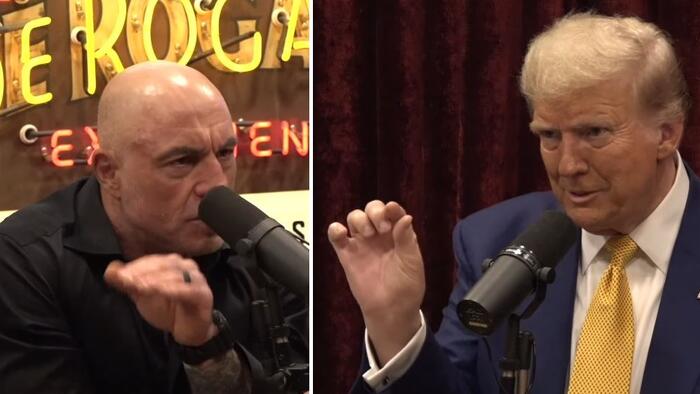In a recent three-hour appearance on the Joe Rogan Experience, former President Donald Trump covered a wide array of subjects ranging from tax reform to media bias, offering insights into his administration and personal views. One provocative idea that emerged during their conversation was Trump’s consideration of eliminating income taxes, proposing a shift towards tariffs as a replacement. This audacious suggestion elicited a candid response from Rogan, who asked if Trump was serious about the plan. In typical fashion, Trump affirmed it with his characteristic confidence, suggesting a fresh approach to taxation that highlights his willingness to challenge traditional economic policies.
The discussion also ventured into Trump’s grievances with the mainstream media, where he and Rogan lamented the propagation of various hoaxes, including the so-called “bloodbath hoax,” the “very fine people hoax,” and the “Russiagate hoax.” Trump’s strong rhetoric underscored his belief that these narratives were deliberate disinformation campaigns designed to undermine his presidency. This theme of media distrust resonates with his supporters and reflects his broader critique of how information is handled by major outlets, painting a picture of a political landscape fraught with misinformation.
On the topic of immigration, Trump offered a contentious perspective on why he believes Democrats are in favor of illegal immigration, suggesting their motivations stem from a mix of disdain for the country, ignorance, or a strategy to gain votes. His remarks were direct and unapologetic, demonstrating a combative stance that characterizes much of his political rhetoric. This viewpoint continues to galvanize his base, appealing to fears surrounding immigration and national identity that resonate with many voters.
Turning to his experiences in the White House, Trump reflected on the challenges of hiring the right advisors, acknowledging that some of his choices turned out to be less than ideal. He referred to certain individuals as “bullies” and “idiots,” emphasizing that he learned valuable lessons about loyalty and competence. This admission reveals a more introspective side of Trump, as he grapples with the complexities of leadership and the implications of trusting the wrong people in positions of power.
The conversation did not shy away from foreign policy either, with Trump asserting that his administration effectively kept Iran and other adversaries in check by leveraging economic threats against China. He claimed that the potential loss of business interests in the United States acted as a deterrent against Iranian oil exports. This strategy reflects Trump’s broader approach to foreign relations, characterized by a willingness to use economic pressure as a tool for national security, a tactic that is likely to resonate with his supporters who favor a more aggressive stance on international issues.
Additionally, the discussion touched on Trump’s views of current political figures, such as Governor Gavin Newsom, and the environmental impacts of offshore windmills, where Trump humorously expressed a desire to be a “whale psychiatrist.” His charismatic and unfiltered remarks have won him a loyal following, as highlighted by Rogan’s comment regarding Trump’s departure from traditional political speaking styles. This uniqueness, along with the mention of his son’s role in youth outreach, showcases Trump’s ongoing relevance in the political discourse while suggesting strategies he might employ to connect with younger demographics. Throughout the conversation, his consistent dismissal of media criticism and reflection on his past decisions paint a vivid portrait of a man still deeply enmeshed in the American political landscape.

